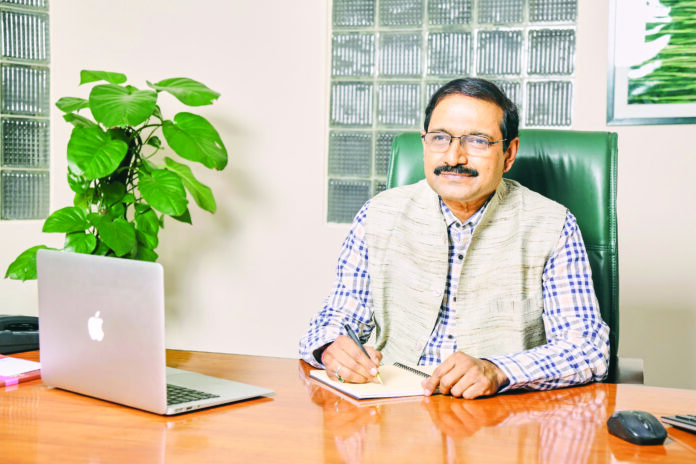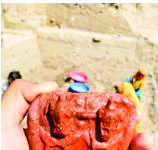In the heart of Delhi, the India Habitat Centre (IHC) stands as a thriving crucible for cultural, intellectual, and social exchange. Under the leadership of Prof. (Dr.) K. G. Suresh, who recently assumed the role of Director, this iconic institution is charting a bold new course. With a storied career as an academician, journalist, and administrator, Dr. Suresh brings a unique vision to IHC that intertwines India’s rich civilizational heritage with its aspirations for a global future.
One of the most significant new initiatives under Dr. Suresh’s stewardship is the launch of the Bharat Bodh Kendra, a unique center designed to promote a deeper understanding of India’s culture, history, and philosophy. In an exclusive conversation with The Sunday Guardian, Prof. (Dr.) K. G. Suresh elaborated on the inspiration behind the Bharat Bodh Kendra: “Our education system, largely influenced by colonial structures, has distanced us from our own identity, our traditions, and our civilization. The Bharat Bodh Kendra is aimed at bridging this gap, by reconnecting people with the core values and philosophies that have shaped India’s history.”
The Kendra, inaugurated by Union Minister Manohar Lal, is part of the Habitat Library and Resource Centre (HLRC) and will function as an intellectual hub. Dr. Suresh envisions it as a space not just for exhibitions but for seminars, workshops, book discussions, and cultural events, making it a lively arena for ongoing dialogues about India’s past and future.
“To engage meaningfully with the world, it is vital to first know one’s own civilization. Only then can we approach discussions with other cultures from a place of strength,” Dr. Suresh remarked. This is particularly pertinent in the current global discourse, where India is poised to become a “Vishwaguru” by 2047—the centenary year of India’s independence.
Dr. Suresh’s vision for IHC extends beyond cultural awakening to transforming it into a vibrant intellectual hub. Drawing from his extensive experience as the former Director-General of the Indian Institute of Mass Communication (IIMC) and Vice Chancellor of Makhanlal Chaturvedi Rashtriya Patrakarita Vishwavidyalaya, Bhopal, he sees IHC as a platform where critical issues such as urban development, sustainable living, and environmental preservation can be discussed and explored.
“IHC should be the think tank of India, a place where policies related to housing, urban planning, and environmental sustainability are deliberated. This is where the Indian knowledge system intersects with the modern world, and it is here that we can initiate global conversations about issues like climate change and sustainable living,” said Dr. Suresh.
Dr. Suresh sees the India Habitat Centre as an embodiment of the ancient Indian philosophy of Vasudhaiva Kutumbakam—the world is one family. “Habitat is not just a place for intellectual exchange within India; it is a space where global cultures can meet and collaborate, sharing not only their challenges but also their solutions,” he added.
While Dr. Suresh’s administrative and academic vision for IHC is transformative, his passion for the arts has also led to the continued success of the Habitat Film Festival. Now in its 17th edition, the festival is a testament to IHC’s commitment to promoting diverse cultural expressions through cinema.
The festival promises a celebration of both Indian and global cinematic heritage, with screenings of films in over 24 languages. “This year’s festival is not just about entertainment. It’s about addressing pressing social issues—human-environment conflict, gender equality, and more—through the lens of cinema,” Dr. Suresh remarked. The festival will also pay tribute to stalwarts such as Raj Kapoor, Manoj Kumar, Rajinikanth, and Shyam Benegal, while showcasing the works of legends like Muhammad Rafi and Tapan Sinha.
Dr. Suresh believes that film festivals like these are crucial in fostering a deeper understanding of the world, especially in the age of digital streaming. “Cinema should be experienced in theatres, where people can immerse themselves in the craft, away from the distractions of OTT platforms. This festival will transport Delhi’s cinephiles to a world of meaningful cinema,” he said.
Reflecting on his multifaceted journey, Dr. Suresh described his transition from a journalist to an academic and administrator as a natural progression. “At the core, I have always been a communicator. My work, whether as a journalist, educator, or now as an administrator, has always been about bridging gaps—whether they’re between people, cultures, or ideas.”
As an academic, Dr. Suresh was deeply committed to bringing the youth to the center of educational reforms. “I have always seen my role as a guide, leading the next generation in the right direction,” he said. His tenure at IIMC and Makhanlal Chaturvedi University left an indelible mark on countless students, inspiring them to engage with media and communication in meaningful ways.
Now, at the helm of IHC, Dr. Suresh is eager to infuse the institution with the same energy and purpose. “IHC should not just be a cultural and intellectual venue but also a space where young minds are encouraged to explore, learn, and grow,” he emphasized. His plans to expand initiatives such as the Habitat Learning Centre, which provides training to underprivileged children, and digitizing the centre’s offerings reflect his commitment to accessible, inclusive growth.
Dr. Suresh’s vision for IHC extends into the future with a focus on accessibility and innovation. From digitizing payments and menus to creating a more user-friendly environment, he is determined to modernize the infrastructure while maintaining the institution’s rich cultural heritage.
“The Habitat we envision will be a place where technology and tradition coexist seamlessly. People should walk in and leave with a sense of having gained something—be it through a cultural experience, a lecture, or even just a passing interaction with art and design,” said Dr. Suresh.
As India prepares for a new era of global influence, IHC under Dr. Suresh’s guidance stands poised to play a crucial role in shaping the intellectual and cultural discourse of the nation. With initiatives like the Bharat Bodh Kendra, the Habitat Film Festival, and a renewed focus on global collaboration, IHC is destined to become an even more vital force in India’s cultural and intellectual landscape.
Prof. (Dr.) K. G. Suresh’s tenure as Director of the India Habitat Centre marks the beginning of an exciting new phase for the institution. With a clear vision of connecting India’s rich cultural heritage with global intellectual and environmental concerns, he is creating a platform that encourages learning, fosters dialogue, and promotes sustainable living. Whether it’s through the Bharat Bodh Kendra or the ongoing Habitat Film Festival, Dr. Suresh is committed to ensuring that IHC remains a beacon of intellectual engagement for years to come.








